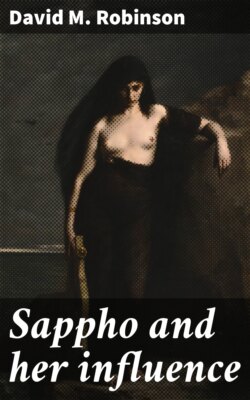Читать книгу Sappho and her influence - David M. Robinson - Страница 9
На сайте Литреса книга снята с продажи.
IV. THE WRITINGS OF SAPPHO
ОглавлениеTable of Contents
The number of poems or fragments (Pl. 8) of Sappho has increased from a hundred and twenty in Volger’s edition (1810) to a hundred and ninety-one in Edmonds. “Though few they are roses,” and a marvellous vitality and mentality permeates their mangled and marred members. Sappho probably had her own collection of her poems, but they were surely not published in a large edition as has sometimes been said. An introductory poem is possibly preserved on an Attic vase, but even of that we cannot be sure. In Roman days there were two editions, one arranged according to subject and the other according to metre, both based on some Alexandrian source much earlier than the book On the Metres of Sappho, published by Dracon of Stratonicea about 180 A.D. Sappho wrote many forms of literature in many different metres, cult hymns or odes, marriage songs, scolia or drinking songs, songs of love and friendship, besides her nine books of lyrics, epigrams, elegies, none of which has survived or been described by any other author, iambics, monodies, and funeral songs like that for Adonis. The Athenian dramatists even pictured her as proposing puzzles and riddles. Colombarius, as quoted by Meursius in his notes on Hesychius, called Sappho the poetess of the Trojans, the meaning of which has recently been made clear by the discovery of the Marriage of Hector and Andromache.
The first poem is the Ode to Aphrodite which was cited by Dionysius of Halicarnassus for its finished and brilliant style,—the style used by Euripides among the tragedians and by Isocrates among the orators. Though the rhythm, ardor, terseness, and noble simplicity can be given in no translation,73 nearly every lover of Greek lyrics has tried his hand at it. Ambrose Philips made thirty-four words out of the first stanza which in the Greek has only sixteen; Merivale found forty-three words necessary; but Tucker and Leonard with strict compression and simplicity manage to translate with twenty-three; Gildersleeve in an unpublished version which I also quote here, and Fairclough use twenty-four:
Broidered-throned goddess, O Aphrodite,
Child of Zeus, craft-weaving, I do beseech thee,
Do not crush my soul with distress and sorrow,
Wholly my mistress.
Rather come, if ever didst come aforetime,
Hearkening to my cry from afar in mercy;
And didst leave the palace of thine own father
Golden and gorgeous;
And didst yoke thy chariot, swift thy sparrows
Drew thee, beauteous sparrows, to earth’s dark surface,
Moving quick their wings from the height of heaven
Through the mid ether.
Soon their journey’s end was attained and smiling
Blessed goddess, smiling with heavenly visage,
Thou didst ask of me what it was I suffer’d,
Why I invoked thee,
What it was I wished to receive of all things,
Maddened in my soul, ‘Who is he thou seekest,
Whom shall I ensnare for my darling Sappho?
Who is it grieves thee?’
‘Nay, if thou but flee he will soon pursue thee,
If he get no presents, he’ll give thee presents,
If thou love him not, he will love thee quickly,
E’en if thou wilt not.’
Come then now again and relieve me, goddess,
From my carking cares and whate’er my spirit
Longeth for accomplish, and on my side do
Battle, my mistress;
(Gildersleeve)
or, with the translation of doves for sparrows:
Guile-weaving child of Zeus, who art
Immortal, throned in radiance, spare,
O Queen of Love, to break my heart
With grief and care.
But hither come, as thou of old,
When my voice reached thine ear afar,
Didst leave thy father’s hall of gold,
And yoke thy car,
And through mid air their whirring wing
Thy bonny doves did swiftly ply
O’er the dark earth, and thee did bring
Down from the sky.
Right soon they came, and thou, blest Queen,
A smile upon thy face divine,
Didst ask what ail’d me, what might mean
That call of mine.
‘What would’st thou have, with heart on fire,
Sappho?’ thou saidst. ‘Whom pray’st thou me
To win for thee to fond desire?
Who wrongeth thee?
Soon shall he seek, who now doth shun;
Who scorns thy gifts, shall gifts bestow;
Who loves thee not, shall love anon,
Wilt thou or no.’
So come thou now, and set me free
From carking cares; bring to full end
My heart’s desire; thyself O be
My stay and friend!
(Tucker)74
Here follow two translations where “he” is changed to “she” in the sixth stanza. The controversy as to the sex of the belovèd turns on the admission or omission of a single letter in the Greek.
Deathless Aphrodite, throned in flowers,
Daughter of Zeus, O terrible enchantress,
With this sorrow, with this anguish, break my spirit,
Lady, not longer!
Hear anew the voice! O hear and listen!
Come, as in that island dawn thou camest,
Billowing in thy yokèd car to Sappho
Forth from thy father’s
Golden house in pity!... I remember:
Fleet and fair thy sparrows drew thee, beating
Fast their wings above the dusky harvests,
Down the pale heavens,
Lighting anon! And thou, O blest and brightest,
Smiling with immortal eyelids, asked me:
‘Maiden, what betideth thee? Or wherefore
Callest upon me?
‘What is hers the longing more than others,
Here in this mad heart? And who the lovely
One belovèd thou wouldst lure to loving?
Sappho, who wrongs thee?’
‘See, if now she flies, she soon must follow;
Yes, if spurning gifts, she soon must offer;
Yes, if loving not, she soon must love thee,
Howso unwilling....’
Come again to me! O now! Release me!
End the great pang! And all my heart desireth
Now of fulfilment, fulfil! O Aphrodite,
Fight by my shoulder!
(W. E. Leonard, unpublished)
